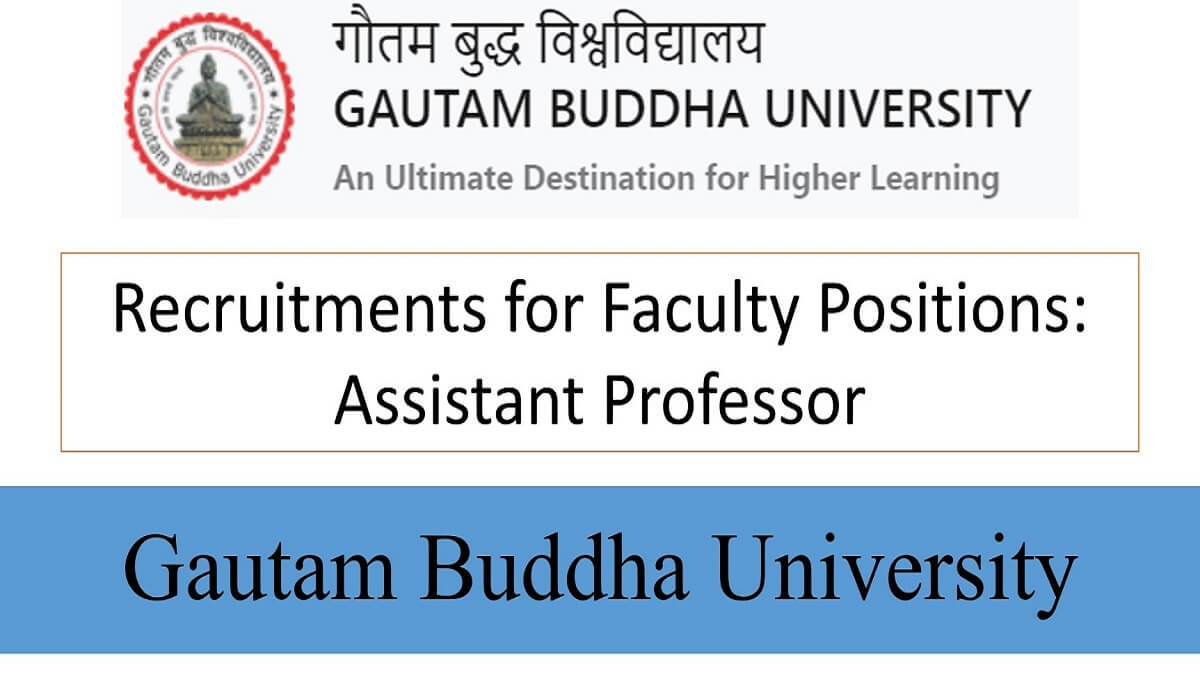- Organization: The Registrar, Gautam Buddha University, Greater Noida, Gautam Budh Nagar-201312 (UP) India” on or before 23.06.2023by 5:30 PM
Guest Faculty Positions: Gautam Buddha University
Gautam Buddha University invites applications for “Assistant Professor on contract for fixed duration (OCFD)” in following Schools: School of Humanities & Social Sciences, School of Information and Communication Technology, School of Engineering, School of Vocational Studies & Applied Sciences, School of Law, Justice and Governance, School of Biotechnology, and School of Management. Interested candidates may send their applications in the prescribed format only through Speed Post/Registered Post/Courier addressed to “The Registrar, Gautam Buddha University, Greater Noida, Gautam Budh Nagar-201312 (UP) India” on or before 23.06.2023by 5:30 PM.
DEPARTMENT
- School of Humanities & Social Sciences
- Political Science and International Relations
- Social Work
- English & Modem European Languages
- Mass Communication and Media Studies
- History and Civilization
- Education and Training
- Psychology & Mental Health
- Economics, Planning & Development
- School of Information and Communication Technology
- Computer Science & Engineering
- Information & Technology
- Electronics and Communication Engineering
- School of Engineering
- Mechanical Engineering
- Civil Engineering
- Electrical Engineering
- Architecture & Planning
- School of Vocational Studies & Applied Sciences
- Applied Mathematics
- Applied Chemistry
- Applied Physics
- Environmental Science
- Food Processing and Technology
- School of Law, Justice and Governance
- Law
- Economics
- School of Biotechnology
- School of Management



Download Official Detailed Notification: Click Here
Application form: Click Here
FAQs
What is the eligibility criteria for the assistant professor position in India?
The eligibility criteria may vary depending on the university or institution. However, in general, candidates are required to have a minimum educational qualification of a Master’s degree in a relevant discipline. Additionally, they may need to qualify in national-level eligibility tests like the National Eligibility Test (NET) or the State Level Eligibility Test (SLET). Some institutions may also require a Ph.D. degree or relevant teaching experience.
How can I apply for an assistant professor vacancy in India?
To apply for an assistant professor vacancy, you typically need to check the official website of the university or institution where the position is advertised. Look for the recruitment section or job portal, and follow the instructions provided for submitting your application. The application process usually involves filling out an online application form, uploading necessary documents such as your resume, educational certificates, and research publications, and paying the application fee if applicable.
What documents are generally required for an assistant professor application?
The documents required may vary, but commonly requested documents include:
Updated curriculum vitae (CV) or resume
Copies of educational certificates (Bachelor’s, Master’s, and Ph.D. if applicable)
Research publications (if any)
Proof of qualifying in eligibility tests (NET/SLET)
Experience certificates (if applicable)
Reference letters or recommendation letters (usually a certain number from academic or professional contacts)
Identity proof (e.g., Aadhaar card, passport)
Passport-sized photographs
Any other documents specified in the application form or advertisement.
What is the salary scale for assistant professor positions in India?
The salary scale for assistant professors in India can vary depending on the university, institution, and location. Pay scales are often determined by the University Grants Commission (UGC) or relevant statutory bodies. The starting salary for assistant professors can range from around INR 50,000 to INR 70,000 per month (approximate figures) for candidates without prior teaching experience. Candidates with a Ph.D. degree and experience may receive higher salaries as per UGC guidelines and institution norms.

